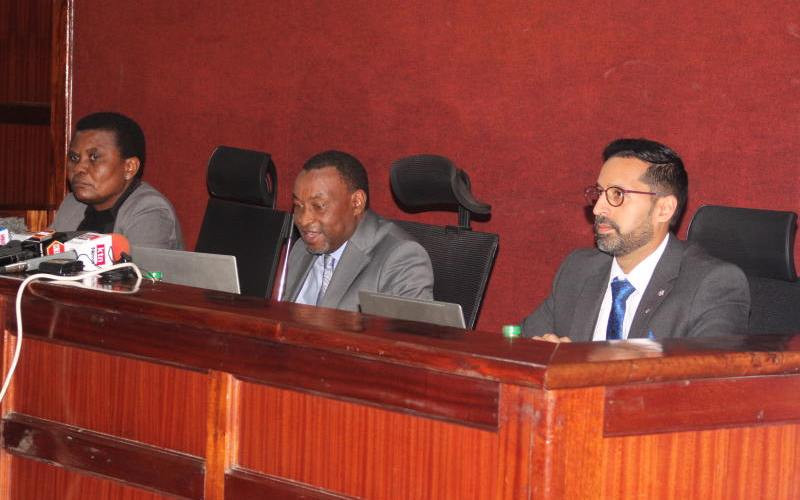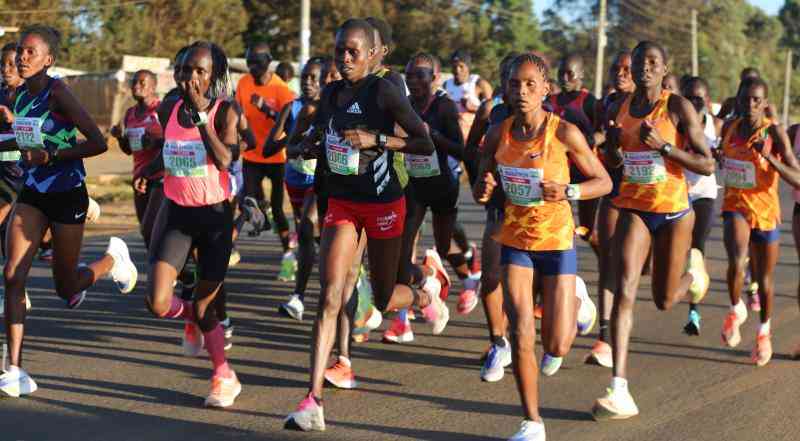 |
Dr David Githii; Former PCEA moderator, who ruffled many feathers during his reign
as he started a campaign to sanitise Parliament off ‘satanic’ symbols |
Dr David Githii, the former PCEA moderator, is no stranger to controversy. During his reign, he ruffled many feathers as he started a campaign to sanitise Parliament off ‘satanic’ symbols. But what is the old man up to now? Kiundu Waweru traces his journey
He brought significant change and stirred controversy in equal measure during his tenure as the PCEA moderator of the General Assembly.
Right after his appointment, Dr David Githii started a countrywide campaign seeking the removal of ‘satanic’ symbols from Parliament and other government buildings.
He claimed the ‘satanic’ symbols included the Court of Arms on the Kenyan currency, the Baphomet at the top of the Speaker’s chair in Parliament (which has since been renovated) and the star at the entrance to Parliament.
He also launched a campaign at the St Andrews PCEA to bring down the artefacts that beautified the doors and windows of the church.
But who is this man who rattled snakes?
Githii was born 65 years ago to a peasant family in Gikambura, a little dry village in Kikuyu near the Church of the Torch.
Growing up during the colonial times, the clergyman had an eventful childhood. In 1952, the colonial government declared a state of emergency following the Mau Mau uprisings and many people, including Jomo Kenyatta, the Kapenguria Six and Githii’s father, were arrested.
“I was forced to sleep in a sack which mother used in her small shamba during the day. Things were bad,” he recalls.
In 1956, he was to start school but his mother could not raise the Sh6 fee.
But he was finally enrolled after his father was released from detention in 1959 and got a temporary job at Thogoto Teachers College.
Githii later went to Kirangari High School and joined Thogoto Teachers College for a P1 Course.
His calling
When he completed his studies, he was posted to Subukia as a primary school teacher.
Within a short while, he caught the eye of the district education officer and was made deputy headmaster. In the second term, the headmaster was transferred and Githii took his place.
“There were teachers with over ten years service and I was charged to lead them in my youth. I had just been a teacher for five months,” recalls Githii. It was a trying moment, as the other teachers resisted his leadership.
In 1977, Githii was transferred to Beestons Primary in Nakuru. For ten years, the school had never sent a single child to secondary school and he was determined to change this.
In his second year at Beestons, few of the 24 pupils sitting the exams joined district secondary schools. Many were called to provincial and national schools.
The then provincial schools inspector in Nakuru recommended they start a secondary school. In 1979, the idea came to fruition and Githii was appointed the head teacher of both the primary and secondary schools.
The reverend impressed the Ministry of Education officials and they promoted him to be the area education officer. But he felt that that was not his calling. “This was an honour for any teacher then. But around that time, I got this strong calling to serve God,” he says.
Risk taker
A father of six then, Githii left a promising career for the unknown.
Amid protests from his family and friends, he enrolled at the St Paul’s Theological College for a Bachelors degree in Divinity.
He graduated in 1982 and was posted to Thogoto Parish, where he taught Church History at the Theological School in Kikuyu, a thing only reserved for ordained ministers.
Githii was ordained in December 1984 and posted to Nakuru Parish, then to Rongai. After four years, he was transferred to Loresho where he received a culture shock.
In Rongai, he used to serve poor people who slept on sacks filled with grass.
In Loresho, he found gated communities inhabited by the rich. They wrote to the head office complaining that he was too ‘primitive’ to serve them.
A door opened just in time and Githii got a scholarship to study a Masters of Art at the University of Dubuque in Iowa, USA.
He returned to Kenya, taught for one year and went back to the US in 1990 at the Fuller Theological Seminary, Los Angeles, for another Masters in Theology and later a doctorate degree.
Back in Kenya, and as the minister for the Muguga Parish, he got a job as a History and Contemporary Issues senior lecturer at the Daystar University.
After three years at Daystar, he was recalled by the church and posted to the Mathare slums.
“I left Daystar as a senior lecturer only to be posted as a pastor in a ‘punishment zone.”
Githii did not know he was being groomed for a larger role.
In 2003, he was unanimously voted as the moderator of the PCEA General Assembly.
“I had never imagined leading the church, and never had interest. But here I was,” he recalls.
He was the office bearer for two terms, from April 2003 to April 2009 upon which he left an indelible mark.
F ought for change
During his tenure, he cut himself as a no nonsense, controversial church leader.
He found a church rooted in the Scottish culture, which he was determined to change.
“The congregate was tied up like cabbages. You could not tell the difference between a church and a funeral service,” he points out.
To attract the young back to church, he introduced musical instruments as part of the praise and worship session.
He faced a spirited fight when he tried to repossess church property that had since become privately owned.
He faced stiff opposition when he went for the age-old church symbols and logos.
“The church logo was a cross. On the horizontal bar was the name Jitegemee with the G at the heart of the cross.The G represents the Masonic or New Age god, the so-called great architecture of the universe.”
The church leadership finally gave in to pressure and brought down the controversial symbols.
Then Githii moved to purify the church buildings, including the head church, St Andrews in Nairobi that had paintings of snakes.
He educated the congregate, explaining that this culture had been inherited from the pagans.
But it was a tough war.
“They waged war against me in the media, saying that I had a demolition squad,” he says.
Not long after, Githii was in a delegation of different church leaders invited to a Parliament opening session to pray for the country.
“In Parliament I looked around and was confronted by snakes and frogs,” the cleric recalls.
His desire was to have a parliament that would have symbols representative of Kenya like the beautiful topography.
Future plans? “I am not tired. I want to serve in another capacity. I know the suffering of my people and I want to serve them in a new and fresh capacity,” he concludes.
 The Standard Group Plc is a multi-media organization with investments in media
platforms spanning newspaper print operations, television, radio broadcasting,
digital and online services. The Standard Group is recognized as a leading
multi-media house in Kenya with a key influence in matters of national and
international interest.
The Standard Group Plc is a multi-media organization with investments in media
platforms spanning newspaper print operations, television, radio broadcasting,
digital and online services. The Standard Group is recognized as a leading
multi-media house in Kenya with a key influence in matters of national and
international interest.
 The Standard Group Plc is a multi-media organization with investments in media
platforms spanning newspaper print operations, television, radio broadcasting,
digital and online services. The Standard Group is recognized as a leading
multi-media house in Kenya with a key influence in matters of national and
international interest.
The Standard Group Plc is a multi-media organization with investments in media
platforms spanning newspaper print operations, television, radio broadcasting,
digital and online services. The Standard Group is recognized as a leading
multi-media house in Kenya with a key influence in matters of national and
international interest.









